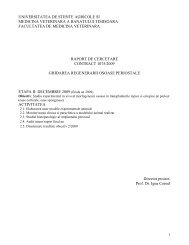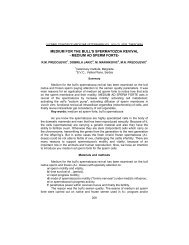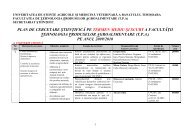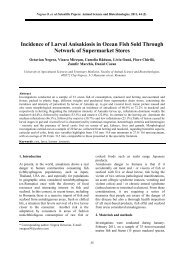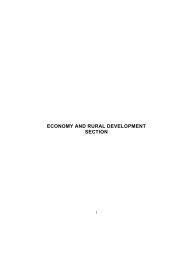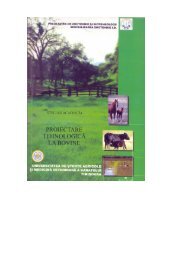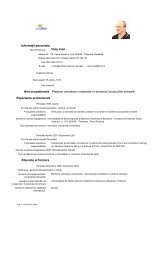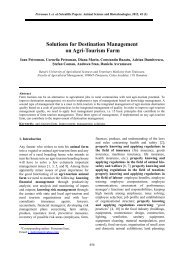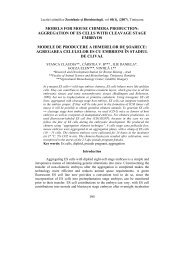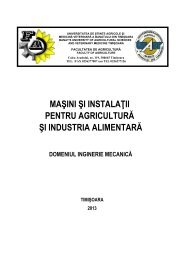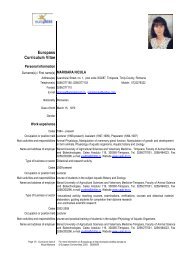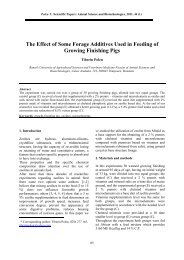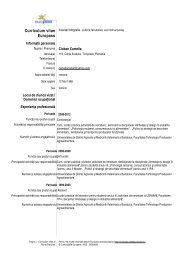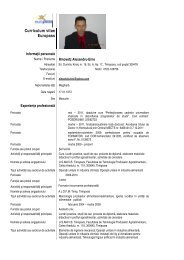journal of linguistic studies
journal of linguistic studies
journal of linguistic studies
You also want an ePaper? Increase the reach of your titles
YUMPU automatically turns print PDFs into web optimized ePapers that Google loves.
THE ORTHOGRAPHIC ADAPTATION<br />
OF ENGLISH BORROWINGS IN ROMANIAN<br />
ANDREEA VARGA<br />
BUASVM, Timişoara, Romania<br />
andreea_varga@yahoo.com<br />
ABSTRACT<br />
This paper aims at researching the English borrowings borrowed into the<br />
Romanian language and the alteration suffered by them from an orthographic<br />
perspective. The focus <strong>of</strong> the analysis revolves around the stages through which a<br />
borrowing undergoes to be adapted or assimilated into the receiving language, but<br />
also a classification <strong>of</strong> the terms pertaining to the donor tongue which are under way<br />
<strong>of</strong> adaptation, fully assimilated or at an inchoate stage in the process. The study <strong>of</strong><br />
socio-<strong>linguistic</strong>s sheds light upon this language phenomenon, endorsing the<br />
theoretical grid <strong>of</strong> the research.<br />
Keywords: Borrowings; Phonetics; Orthography; Socio-<strong>linguistic</strong>s<br />
1. INTRODUCTION<br />
When a foreign word is borrowed into a language, it surpasses an elaborate process <strong>of</strong><br />
adaptation to the <strong>linguistic</strong> system <strong>of</strong> that language. The adaptation is incipiently deemed<br />
on a phonetic level.<br />
As a rule, the speakers emulate the pronunciation <strong>of</strong> the borrowing (or loanword) as it<br />
is pronounced in the donor language but an accurate phonetic replica is hardly possible.<br />
The phonemes <strong>of</strong> the native language are liable to replace the unfamiliar sounds <strong>of</strong> the<br />
lending language. The form <strong>of</strong> the borrowing causes, sometimes, such difficulty in<br />
pronunciation that the adaptation <strong>of</strong> the word is almost unachievable.<br />
Romanian spelling is mainly phonetic (Graur 1995; Ciobanu 2004), phonemic more<br />
precisely (Avram 1990) unlike English spelling which is etymological, a <strong>linguistic</strong> feature<br />
that generates “a discrepancy between the written form and the pronunciation <strong>of</strong> the most<br />
English words” (Ciobanu 2004). She also asserts that “phonetic spelling” has to be<br />
understood according to Vasiliu’s definition as “a system with each sound denoted by a<br />
letter and each letter having the same sound to denote it”. (Vasiliu 1979)<br />
2. THE CLASSIFICATION OF BORROWINGS<br />
The English borrowings can be divided into three categories, according to their<br />
spelling (Hristea 1995):<br />
- borrowings that have a phonetic spelling: meci, aut, gol, aisberg, lider, miting,<br />
şiling, <strong>of</strong>said, spicher (written like this it has the meaning <strong>of</strong> “announcer”,<br />
“presenter” in Romanian), finiş, seif, feribot, henţ, etc.;<br />
- borrowings that have an etymological spelling.<br />
It seems that the general propensity <strong>of</strong> literary Romanian is, currently, to spell the<br />
English borrowings the same way they are spelt in the source language. The process <strong>of</strong><br />
adaptation is deliberately “hindered” due to some psychological and socio-<strong>linguistic</strong><br />
29



